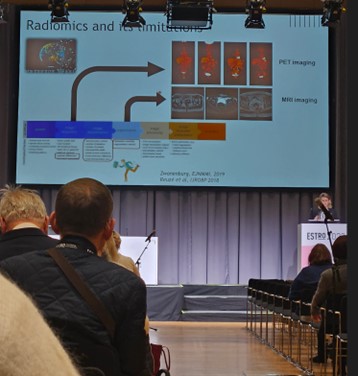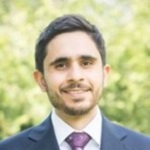ESTRO 2023: Brachytherapy Track
Clinical perspective
As a clinical oncologist with an interest in brachytherapy, ESTRO 2023 did not disappoint me. Brachytherapy had a strong showing within the conference, as it featured in lectures and symposia across the timetable.
ESTRO 2023 kicked off with the pre-meeting talks, one of which covered the evolving role of brachytherapy for cancer of the gastrointestinal tract. Chaired by Dr Alexandra Stewart, the course explored the role of oesophageal brachytherapy in radical and palliative settings, with a focus on logistics of treatment delivery and associated toxicity. Other courses were on biliary and hepatic brachytherapy, and the final lecture, by Professor Jean Pierre Gerard, was on contact-X-ray brachytherapy in rectal cancer. This was particularly topical in the context of organ preservation in early cT2-cT3 rectal adenocarcinoma (OPERA) trial, the results of which were presented at the conference. These showed encouraging organ preservation rates with use of contact X-ray brachytherapy boost.
A prominent topic at ESTRO 2023 was the role of artificial intelligence (AI) in oncology practice. Proffered papers in gynaecology oncology featured growing interest in the application of AI in brachytherapy. An example of this was an overview of automated adaptive planning for cervical cancer in brachytherapy, which was presented by Dr Supriya Chopra from the TATA Memorial Hospital in India. The large number of patients treated through the use of brachytherapy at this centre necessitated a strategy to improve efficiency and planning time, and this requirement led to the development of automated planning that used machine learning. The development of automated planning and the data repositories required were discussed by Prof Tagliaferri from Italy, who highlighted the next steps that were required to develop the systems needed for a truly automated brachytherapy planning system.
The Groupe Européen de Curiethérapie (GEC)-ESTRO assembly offered a good opportunity to catch up on different courses and events that had been held by the committee across the previous year. These included a variety of contouring workshops and educational events. The assembly also highlighted an increasing concern regarding the future of brachytherapy provision, with limitation in training of oncology residents a key issue. One aspect of brachytherapy provision and training ‑ the centralisation of services ‑ was the subject of a debate session. The motion “This house believes that centralisation will have a positive influence on the administration of brachytherapy procedures” was supported by Dr Ann Henry and countered by Prof Hannoun Levi. Whilst centralisation was supported by 80% of the vote prior to the debate, this shrank to only 40% by the end. Reasons for this change included concerns regarding training of residents in brachytherapy, and the inability to cater to patients in rural areas.
Other sessions on brachytherapy were focused on its role in the treatment of different tumour types. There were talks on oral, breast and skin brachytherapy, but the majority of sessions were focused on gynaecological and prostate brachytherapy. A particularly interesting session covered the exploration of dose-escalation strategies that could be applied in image-guided radiotherapy, stereotactic body radiotherapy (SBRT) and brachytherapy. Dr Alfonso Iturriaga and Dr Andrew Loblaw presented the use of dose escalation in SBRT in combination with brachytherapy to treat prostate cancer. Dr Cyrus Chagari and Dr Umesh Mahantshetty contrasted the approach to the use of brachytherapy to treat primary and recurrent vulval cancer in France with that taken in India. Another symposium was focused on strategies to risk-stratify cervical cancer patients to offer a personalised brachytherapy approach that used biomarkers from tumour biology and image radiomics.
With so much being covered in ESTRO 2023, I look forward to ESTRO 2024 and what it has to offer from and for the brachytherapy community.

Legend picture 1
Charlotte Robert presents a talk entitled 'Non-invasive tumour characterisation: perspectives for brachytherapy' in the risk-adapted personalised brachytherapy session on 14 May

Mohammed Abdul-Latif
Clinical research fellow
Mount Vernon Cancer Centre
Northwood, UK